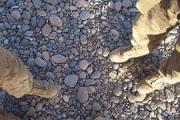-
Council Member

 Patrol Base Density and Proximity - Too many and too close?
Patrol Base Density and Proximity - Too many and too close?
I am typing away in a crowded MWR internet center in Manas, Kyrgystan, and instead of simply sleeping until hungry, I was reading up on the Marine Corps' recommendation of a former Corporal for the Medal of Honor. First off, good on the lad for doing beyond what might have been expected in that deadly valley. I linked from that article in the Marine Corps Times, and over to onethat highlighted the struggle of 3/5 to quell the insurgents in Sangin, and it actually made me pose the subject questions.
It seems, in the 3/5 article, that there were a number of patrol bases establised by the British in Sangin, but they consumed so much manpower securing and supplying them that the insurgents actually gained more freedom of maneuver in the process.
This flies contrary to much of what I had come to accept as a basic truth for COIN (in certain cirumstances), which was break away from the super-FOBs, establish oneself close to the population, and actually provide security. It also stands in contrast to much of the doctrinal literature written in the past five years, which highlights how smaller and closer is better. I know there must be more to the analysis of the British effort, so I'm curious what folks here have to offer, either through first-hand experience or other pondering.
And before this thread goes any further, I'm not keen on hearing the B.S. that the Brits didn't patrol enough, and weren't aggressive enough, or were too risk-averse to tame Sangin. Save that for the tabloids and drama yarns. I've seen a few moments of Ross Kemp that tell me otherwise when it comes to the blood the British have spilled, and although I never set foot in Sangin, I dont buy into the hype that is often spun.
I am simply trying to look at the issue and figure out where the tipping point may be, between securing the populace at the cost of becoming over-extended. Are there any historical examples from past small wars that should be factored into the decisions to apply a patrol base methodology? What are some of the measures of effectiveness.
Tags for this Thread
 Posting Permissions
Posting Permissions
- You may not post new threads
- You may not post replies
- You may not post attachments
- You may not edit your posts
-
Forum Rules








Bookmarks